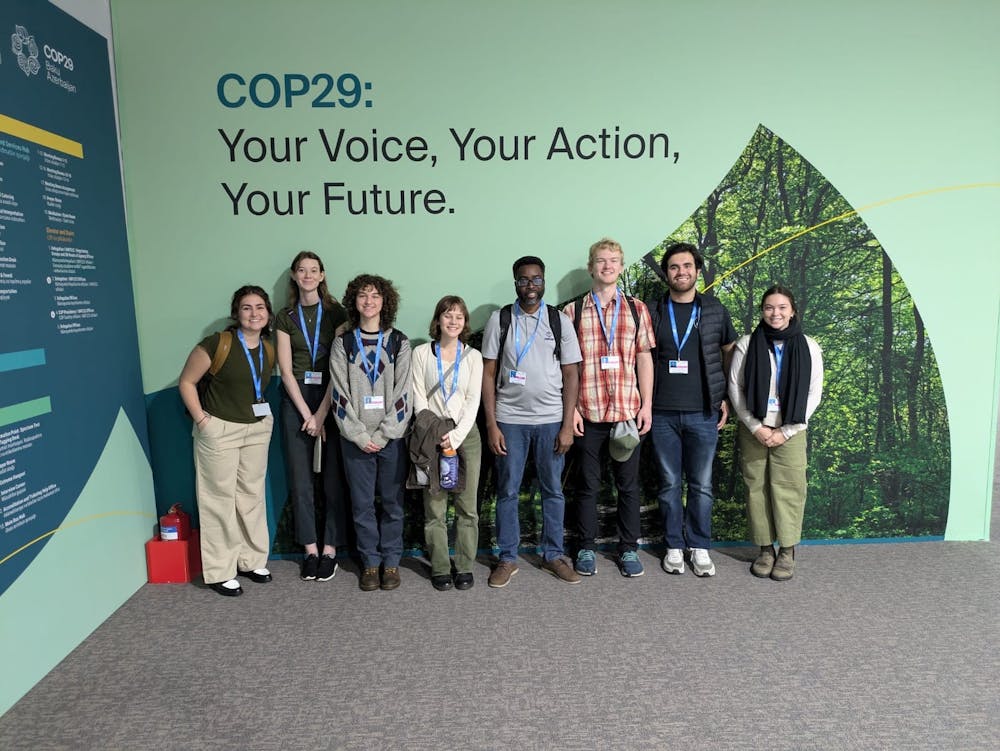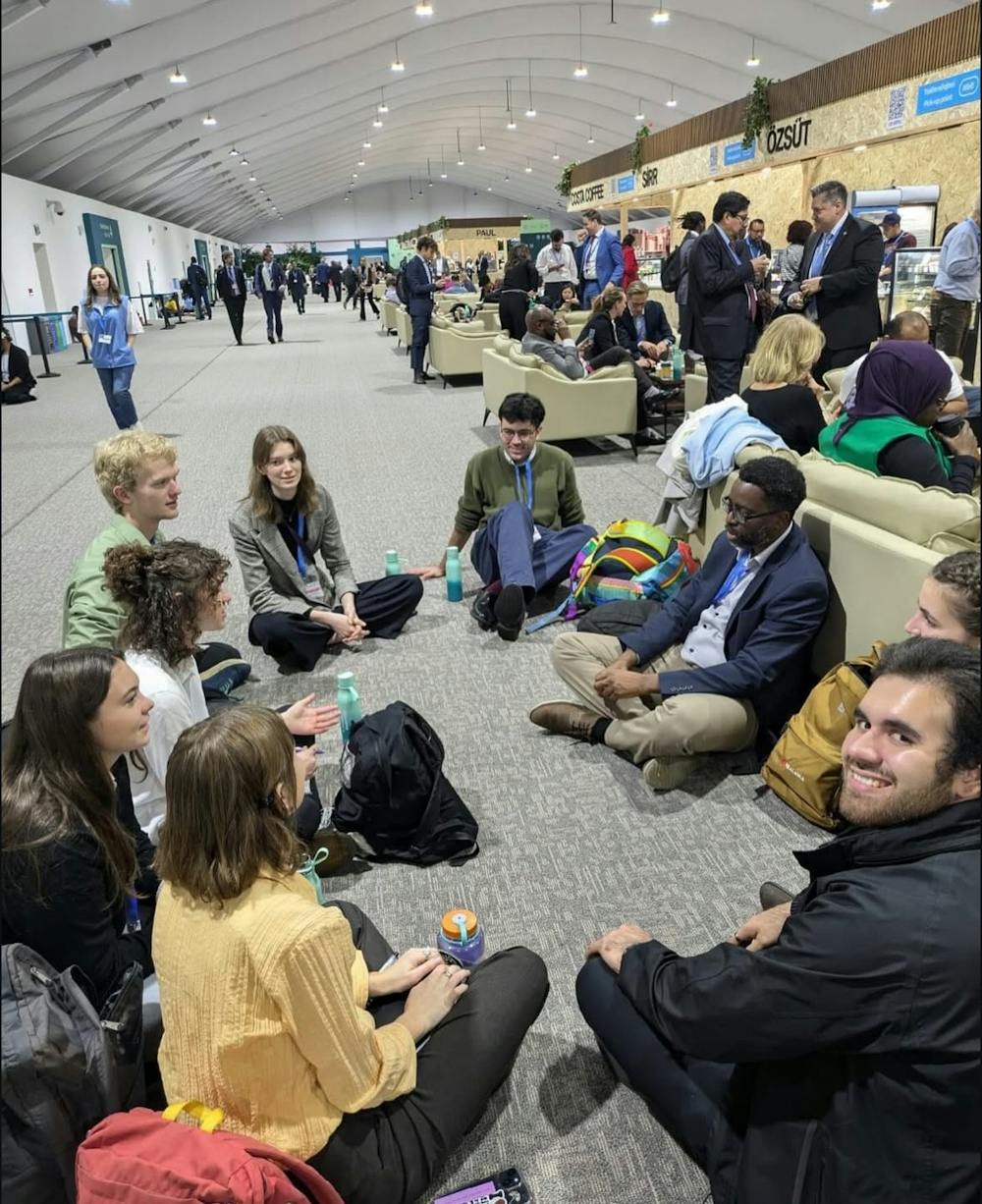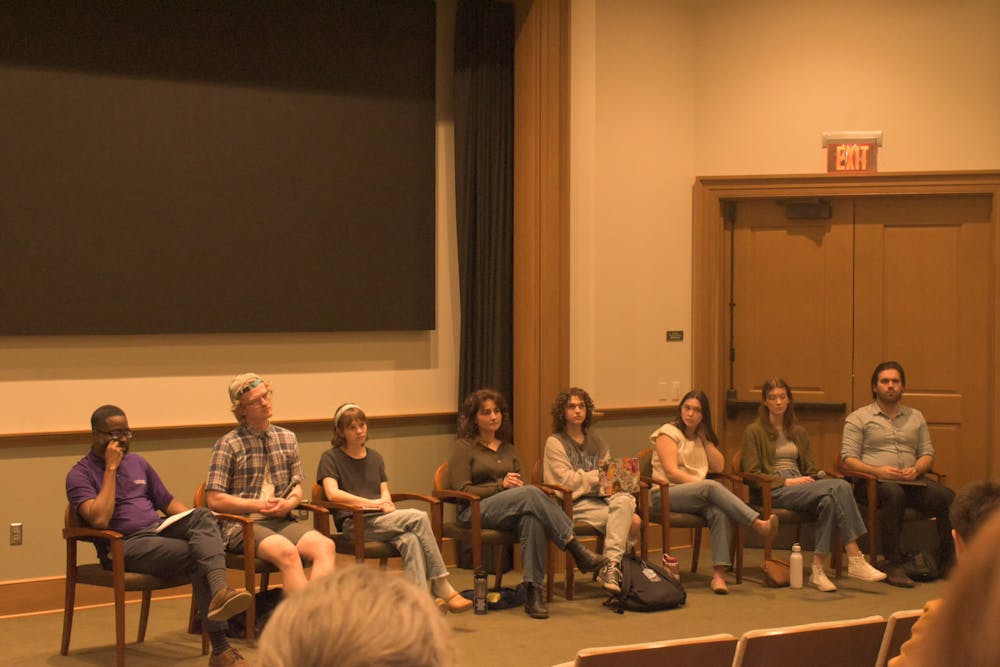When junior environmental ethics and policy and English major Robin Aughney first entered the Conference of the Parties (COP29), he felt out of place, even with an environmental ethics and policy education under his belt.
“It's hard not to have imposter syndrome in that situation regardless, and then for everyone around you to be 50 and wearing a designer suit is just like, ‘What am I doing here?’” Aughney said.
Last November, seven students traveled to Baku, Azerbaijan to participate in COP29 with environmental science Associate Professor Neil Oculi, who is a negotiator of St. Lucia. On April 4, Constructive Dialogues, guided by Associate Professor of Political Science Anne Santiago, held an informational panel with the seven students and Oculi.
The Beacon spoke with four of the student COP29 attendees about their experiences in Azerbaijan and what they learned about climate policy at the conference.

What is COP29?
COP is a conference held in different countries each year. The conference is guided by the United Nations Framework Convention on Climate Change, with the goal of parties from various countries, organizations and economic statuses to negotiate finances for mitigating the effects of climate change in small and developing nations.
The seven students were selected because of their demonstrated interest in attending the conference during Oculi’s Fall 2024 preparation course “Climate Change Negotiations: The Road to the Conference of the Parties (COP).”
The students’ official title at COP29 was “party overflow,” meaning they could enter as St. Lucia delegates, but could not participate in negotiations or contradict any of St. Lucia’s demonstrated values, according to the April 4 panel.
According to senior environmental science major Emma Niemela, the conference promotes countries’ environmental agendas, making it a highly sought-after opportunity to host.
A country’s bid to host COP needs approval from nearly 200 countries present at the previous conference. For COP29, Russia blocked many European Union (EU) countries from hosting due to their support for Ukraine, leaving only Armenia and Azerbaijan.
Niemela also attributes the bid’s controversy to the long-standing conflict between Azerbaijan and Armenia. Azerbaijan was ultimately chosen to host as part of a deal with Armenia in exchange for the release of Armenian prisoners.
“A lot of people were very unhappy that the conference was hosted there, because that country [Azerbaijan] has human rights violations and hosted a bunch of fossil fuel lobbyists before the conference,” Niemela said.
Senior environmental ethics and policy major Jojo Taylor touched on the conference’s tensions as also caused by who participated in the conference.
“I think it's grown more controversial and less effective through the years because they're allowing everyone a seat at the table,” Taylor said. “Which is, in one sense, good, but oil and gas lobbyists are beginning to have a bigger seat at the table than the countries that really need representation and protection.”
The student experience
COP29’s focus was to finance the adaptation and mitigation of the climate crisis for small and developing nations. At COP29, developing nations requested $1.3 trillion and were met with a $300 billion settlement.
Niemela said she saw leaders hindering policy processes and neglecting opportunities to enact change, which she found disheartening.
“[Oculi is] from St. Lucia and his whole delegation was there on that last night when they were making the final financial decision,” Niemela said. “Almost all LDCs [least-developed countries] and SIDS [small island developing states] walked out of the negotiations, because they're like, ‘this is completely unacceptable.’ So it was really stressful.”
In addition to grappling with political and economic conflicts, the students were also navigating a new country without knowing the official language.

Aughney said they had 30 hours of travel on five planes, but getting used to the flights wasn’t the only adjustment students had to make. They also faced obstacles like dietary limitations and figuring out time management.
“I have certain dietary restrictions, so figuring out how to navigate that in a [new] country is not very opportunistic for me to eat,” Aughney said. “And meeting so many different people, it was really profoundly beneficial in that regard.”
Taylor took time around the conference to study for finals that loomed a couple weeks ahead.
“It was right before the semester ended, " Taylor said. “So we would take a few hours every day, like in the morning or at night, to do our work.
The students were also responsible for navigating the conference themselves, as Oculi, a negotiator, spent most of his time behind closed doors. As a result, students attended talks and conferences aligning with their interests.
“I remember going to a press conference where people from different tribes across Arizona and Washington [shared] their thoughts about the election and how it will affect them,” Taylor said. “Specifically, what they can do to fight against it, especially with their knowledge base, and to not feel discouraged.”
Themes of these sessions ranged from processing the election to tracking military carbon emissions and urban engineering sustainability.
Inspiration and expansion
During the April 4 panel, senior civil engineering major David Padilla and senior environmental science major Gus Smith discussed feeling hopeful after witnessing children give a presentation.
They also felt at ease during sections of the conference which contained thousands of activists, non-governmental organizations (NGOs) and grassroots organizations, known as the “Green Zone.”
Importantly, Aughney thinks their exposure to different jobs and organizations at COP29 informed his perspective on environmental work.
“To see such a wide variety of professionals doing their jobs and learning what those titles are and what the organizations are that are doing that work, and figuring out what resonates with you and what doesn't is so valuable,” Aughney said.
Niemela also expressed eagerness to work for non-profits and getting involved in grassroots policy to trigger change at the local level.
“It is so crucial that we don't give up and we don't stop going to these things,” Niemela said. “Keep good people going and fighting for what's important to them, because otherwise it’s people who don’t care that are making all the decisions.”
Additionally, Oculi plans to expand the program by bringing more students to COP in the future.
As a climate change negotiator, Oculi wants to encourage more participation in COP from those prioritizing the environment over capitalizing off of it. He sees this happening by bringing university students to the conference.
“The goal is to instill hope, radicalness and energy into the young people,” Oculi said.
Clara Pehling is a reporter for The Beacon. She can be reached at pehling28@up.edu.








